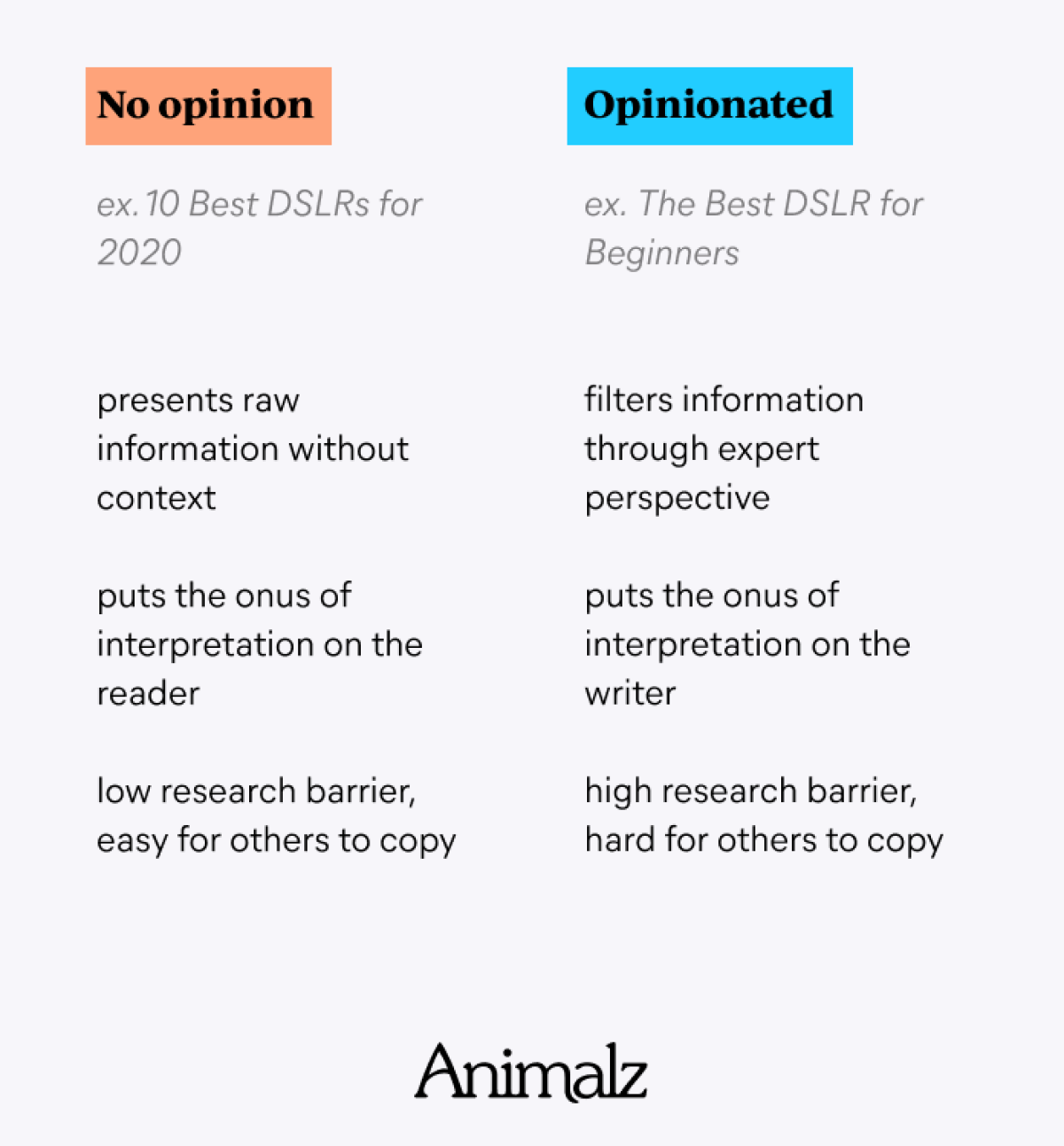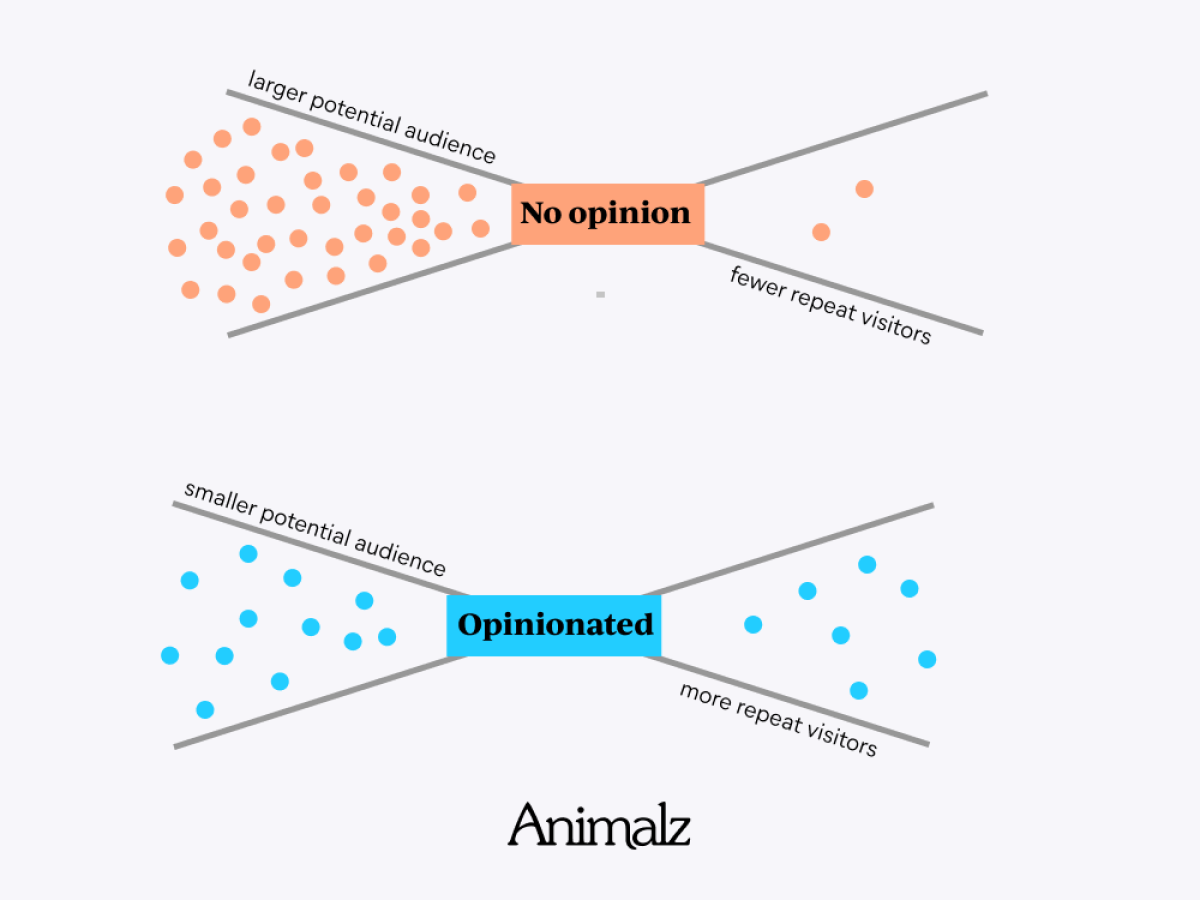Wirecutter carved out a $150-million niche in the crowded affiliate marketing industry by understanding one core tenet of content marketing: opinions are not optional.
Imagine you want to buy a DSLR camera. You’re a photography novice, so your starting point is a Google search for “best beginner dslr.” Google spits back a page of results, and, without exception, every article looks like a variation of the same tired format:
The 10 Best DSLRs
7 Best DSLRs for 2020
The Best DSLR Cameras for Beginners
Best Entry-Level DSLR Cameras in 2020 (11 Top Picks!)
The search results are swimming in listicles, each offering multiple camera choices. In fact, they seem to be in a race to offer the broadest possible range of options.But Wirecutter’s article is different.Instead of offering a list of 5 cameras, or 10, or 20, it recommends a single product. It sorts through the same cameras the other articles mention, but it goes a step further and says, “This is the single best camera for beginners” (for any budding photographers reading—it’s a Nikon D3500).
It shares an opinion.
This is why Wirecutter wins. Most content today avoids having an opinion—and suffers for it. Articles tend to take the path of least resistance, consolidating information that’s available elsewhere on the web instead of reaching its own conclusion and taking a stand. The onus of decision-making is on the reader instead of the writer.Like Wirecutter, great content marketing does the harder, better thing: it shares an opinion. In doing so, it becomes more useful, more memorable, and harder to copy.
Raw Information Isn’t Valuable
An article like “The 10 Best DSLRs” is less helpful than it seems at first glance.Offering an unbiased selection of every possible camera in a price range seems useful: we’re offering the reader maximum choice and letting them make up their own mind. But the reader wants bias. They don’t want to filter through 10 similar products; they can buy only one product, so they want to know the single, best product or strategy. That necessitates an opinion.The same principle applies across all content marketing. The easiest, laziest, and least useful approach to recommending products or sharing advice is to publish a data-dump and expect the reader to wade through it to glean significance.

Information alone is rarely valuable: we can find a list of DSLR cameras on any ecommerce store. Instead, it’s the expert interpretation of that information that matters. Great content often takes the same basic information as any other, but it overlays an opinion that helps the reader understand and use it.
Information alone is rarely valuable. It’s the expert interpretation of that information that matters.
Instead of writing a generic article such as “10 Writing Tips,” it’s better to share your opinion as to which single tip offers the greatest benefit. We did this with BLUF: The Military Standard That Can Make Your Writing More Powerful, using our experience as professional writers and editors to share the highest-leverage concept within our arsenal. We took the raw information—ways to improve writing—and filtered it through our expert opinion.
Opinions are Defensible
Content that’s easy to create is also easy to copy.Returning to our DSLR example, most of the search results look like copycats of “The 10 Best DSLRs” because that is the easiest format to create. Anyone can find a list of cameras under $500, so everyone does. Every article is riffing on the same easy-to-find source material.This problem is prevalent throughout content marketing. Most content marketers have great writing chops, but often lack industry experience. They have to learn the ins and out of their new industry—the jargon and the acronyms, the players and the trends—and their content reflects their learning process. They haven’t had the experience or the exposure to form strong opinions, so they never evolve past actionable content.Good opinions are hard to come by. They require genuine experience, or research, or interviews, and they can’t be cranked out at a dime a dozen by any content marketer. In their attempt to find the best wine glass, Wirecutter’s review team“considered over 250 glasses; blind-tasted wine in more than 80 of them; and enlisted a winemaker, a sommelier and a wine critic.” Their research creates a real barrier to entry for content competitors.Opinions are more defensible because they result from experiences and information that few people possess. Few people can copy Chris Savage’s writing, because few people have founded, funded, and then bootstrapped a startup. Few people can emulate CB Insight’s opinion that management consulting is on the verge of massive disruption because few people are willing to conduct the same laborious research.
Polarization Beats Placation
Utilitarian content like “The 10 Best DSLRs” can generate lots of traffic, but traffic alone is a vanity metric.Content marketing should drive revenue. We want to attract customers, and to do that, we need people to remember our brand and care about our message. Sharing a laundry list of cameras is safe because you’re unlikely to omit any popular choices. But it’s forgettable, and it relegates your writing to the status of a commodity.Most content tries to appeal to the broadest audience possible and, in doing so, fails to engage anyone. Opinionated content appeals to a smaller audience, but it reaches them in a way that’s infinitely more memorable. It encourages self-selection: instead of casting the widest possible net, and filling your pipeline with tire-kickers and wrong-fit visitors, it allows you to find and connect with your people.

Wirecutter caught flak for overlooking the fan-favorite Speed Queen top-loader for its pick of best washing machine, but die-hard Speed Queen devotees are not Wirecutter’s target audience—after all, they already have an opinion as to which washer is best. Wirecutter is designed for people who care enough to Google, but not enough to go deep into independent research.One startup, Laika, argues that compliance isn’t a box-checking exercise—it’s a powerful growth mechanism. Not everyone will agree, but for those who do, Laika is the perfect partner. Hiten Shah argued that Trello is a relative failure—a controversial stance that’s infinitely more memorable than the generic “How Trello Grew” equivalent.
Your Opinion Matters
Wirecutter does what most content marketing is allergic to doing: it stakes a claim. It puts in the hard work required to research, understand, and recommend a single product. All content should follow their example.There was a time when simply sharing information—like definitions, listicles, and basic “how tos”—was a valuable function of content marketing. But today it’s just noise. In industries already crowded with basic content marketing, the role of content isn’t to present a smorgasbord of unbiased possibilities. Instead, it should provide the expertise required to navigate those options. Even a listicle should share an opinion.Great content does the heavy lifting for the reader, taking the available information—be it products on offer, strategies to execute, or tactics to try—and filtering it through experience and research. In doing so, it creates something that’s more useful, more engaging, and harder to copy.
